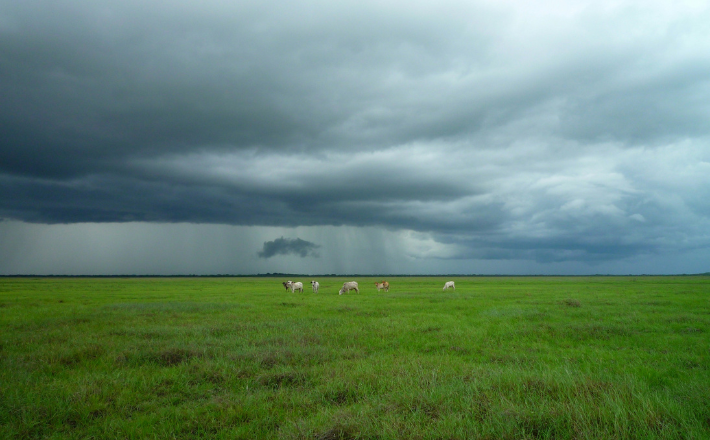Commentary on Isaiah 5:1-7
Isaiah’s song of the vineyard in 5:1–7 may be the most click-bait biblical text ever. But in reality, it’s a radical click-bait-and-switch: Isaiah rivets his listeners and then pulls the rug out from under them in a one-two combo that would make the most captivating influencers jealous.
Context
Isaiah, son of Amoz, lived around 750–700 BCE, a time of multiple crises in Jerusalem. He was a spokesperson for YHWH––otherwise known as a prophet. Like many residents of Jerusalem, Isaiah took very seriously the promises YHWH had made to take care of the city and the Davidic king in perpetuity (see 2 Samuel 7; Psalm 48). But Isaiah was also deeply concerned about justice. Of course, ancient kings claimed that their station gave them the power to dictate justice itself, so it won’t surprise us to learn that the elites claimed the right to all the land, which forced the lower classes to make do with very little.
In contrast, the early Israelites claimed that YHWH owned all the land, and that YHWH had graciously given the land to the people, so that the land would be divided equally among them (see Numbers 26:53–56). This wasn’t just an issue of real estate: YHWH wanted Israel to care for the vulnerable and the poor among them by ensuring all people access to farmland.
Over time, however, the tribes of Israel demanded a king, even though this would lead to economic and political oppression (see 1 Samuel 8:10–18). The people wanted military and economic productivity, even if it courted their own disaster––and reluctantly, YHWH relented.
As predicted, the kings of Israel and Judah stole the best farmland and manipulated the justice system to take out objectors (see 1 Kings 21). The kings demanded ever-increasing levels of forced labor to build royal projects like palaces, storehouses, and fortifications (see 1 Kings 5:13; 9:15; 11:28; 12:18); they demanded ever-increasing taxes of agricultural products that the people needed to live (as in Nehemiah 5:4); and they engaged in wars that led to the rebuilding of villages as strongholds and the military service of many young men (see 1 Kings 16:24; 2 Chronicles 14:6).1
These changes pushed farmers into debt and led to their land being seized, so the elite gained control of vast amounts of land upon which the farmers now sharecropped (see Isaiah 5:8–10). This injustice is precisely what YHWH warned about in 1 Samuel 8, and it’s what Isaiah often denounced (see Isaiah 3:10–11, 14–15; 5:7–10; 10:1–4).2
Text
As a prophet, it was Isaiah’s job to get up in front of the elite in Jerusalem and tell them what was on YHWH’s mind. But he had to get creative about his message: Nobody likes hearing that they’re being condemned. So he decided to write a hit love song, like the Song of Songs––which was a compilation of popular ancient love songs in Judah (“song of songs” is another way to say “the best songs,” or maybe “the ancient top 40”). Ancient professional singers wrote lyrics that were not only steamy in their time, but are so in ours too. Wealthy people loved these racy songs at parties––so when Isaiah got up to address the elite crowd at a feast in Jerusalem, some onlookers might have been amused that the old religious guy picked up the mic and then immediately made it clear he was going to sing a popular, racy love song (5:1). I bet people paid attention.
The song was about a lover and the lover’s “vineyard”—which is pretty clearly a metaphor for a lover. Grapes, wine, digging and plowing fields, a horn full of oil (sometimes translated as “fertile hill”), erecting a tower––I don’t have to explain these, right? The euphemisms were as obvious back then as they are now. The poetry is beautiful and skillful—Isaiah was known as an amazing poet—but here he seemed to be “selling out,” writing a hit song that was just about love, all to make people happy.
But then the twist comes: After all the strenuous labor that goes into making a vineyard fertile, the crop turns out to be “wild grapes” (literally, “stinky things”; verse 2). At this point in the song, I imagine a giant record scratch, and the music stops. What kind of love song is about stinky things? This is the twist that only comes out after everyone was into the song: Isaiah now demands that the people judge between the farmer and the vineyard, as if they were in court (verses 3–4). The farmer is the plaintiff now, and is deeply upset by all the effort and resources put into making this vineyard, all for it to produce stinky, worthless grapes. No farmer will keep putting energy or money into those vines––so the farmer inevitably rips them up and finds a new piece of land to farm, hopefully with better soil and seeds (verse 6).
In verse 7, we have yet another twist, and this is the big one: The vineyard represents none other than the elite Judahites with whom Isaiah is partying at that moment (the “honored men” and “nobility of Jerusalem,” who are “heroes at drinking wine”; verses 13–14, 22). They were supposed to be the fruit of YHWH’s labor––here called “YHWH of hosts,” menacingly referencing the divine armies––yet they have been abusing the vulnerable within their own community.3 God was hoping to see justice (mishpat) blossoming in their lives, but instead saw bloodshed (mispaḥ), and instead of righteousness (tsedaqah), YHWH heard the cry of the oppressed (tse’aqah).
This wordplay artfully draws attention to the shocking reversal of justice and righteousness in the land and serves to poetically condemn the predatory behavior of the elite in Judah. The word used for “cry of the oppressed” (tse’aqah) also occurs in Genesis 4:11 as the cry of the blood of Abel, which YHWH hears and responds to; it is also the word for the cry of the enslaved Hebrews (Exodus 2:23), and YHWH emphasizes that when vulnerable people cry out like that, YHWH will respond by vigorously defending them, even to the point of violence (22:21–24).
So, when Isaiah tells the elite Judahite partygoers that YHWH has heard the cry of the vulnerable who are being oppressed, it’s more than a subtle threat. It’s a demand for immediate action. And that is how you get people’s attention, for better or worse.
These points were immediately obvious in Isaiah’s day. For us, they take a little bit of background. We need to introduce some of the historical background and cultural context for the twist to really take full effect. This likely won’t all fit in one sermon. But with some skill, perhaps one could introduce these themes over a few weeks so the rhetorical effect of Isaiah’s masterpiece could find its audience even today.
Notes
- See Gale Yee, “He Will Take the Best of Your Fields: Royal Feasts and Rural Extraction,” JBL 136 (2017): 821–38.
- See Marvin Cheney, “The Political Economy of Peasant Poverty: What the Eighth-Century Prophets Presumed but Did Not State,” JRSSup 10 (2014): 34–46; Matthew Coomber, “Caught in the Crossfire? Economic Injustice and Prophetic Motivation in Eighth-Century Judah,” Biblical Interpretation 19 (2011): 396–432.
- Marvin Chaney, “Whose Sour Grapes? The Addressees of Isaiah 5:1–7 in the Light of Political Economy,” Semeia 87 (1999): 105–22.


August 17, 2025